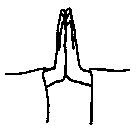Lunfardo
 Lunfardo was a colorful, slangy argot of the Spanish language which developed at the end of the 19th century and beginning of the 20th century in the lower classes in and around Buenos Aires.
Lunfardo was a colorful, slangy argot of the Spanish language which developed at the end of the 19th century and beginning of the 20th century in the lower classes in and around Buenos Aires.Many lunfardo expressions have entered into the popular language and have become an integral part of the Spanish spoken in Argentina and Uruguay. A few have been recognized even by the Real Academia Española. Lunfardo is frequently found in the lyrics of tangos, supplying nuances and double-entendres with overtones of sex, drugs, and the criminal underworld.
Much of lunfardo arrived with European immigrants, such as Italians, French, Portuguese, and Poles. It should be noted that Italian immigrant spoke their regional dialects and not standard Italian; other words arrived from the pampa by means of the gauchos; a small number originated in Argentina's black population.
Most sources believe that lunfardo originated in jails, as a prisoner-only argot. Circa 1900, the word lunfardo itself (originally a deformation of lombardo in several Italian dialects) was used to mean "outlaw".
Lunfardo words are inserted in the normal flow of Rioplatense Spanish sentences. Thus, a Mexican reading tango lyrics will need, at most, the translation of a discrete set of words, and not a grammar guide.
A characteristic of lunfardo is its use of wordplay, notably vesre (reversing the syllables). Thus, tango becomes gotán and café con leche (latte, café au lait) becomes feca con chele.
Lunfardo employs ingenious metaphors such as bobo ("dumb") for the heart, who "works all day long without being paid", or bufoso ("snorter") for pistol.
Finally, there are words that are derived from others in Spanish, such as the verb abarajar, which means to stop your opponent's blows with the blade of your knife and is related to the verb "barajar", which means to cut or shuffle a deck of cards.
Examples
* Manyar - To know (from the Italian mangiare -to eat-)
* Morfar - To eat (from French argot morfer -to eat-)
* Laburar - To work (from Italian argot lavoro -work-)
* Algo voy a cerebrar - I'll think something up (cerebrar from cerebro -brains-)
* Chochamu - Young man (vesre for muchacho)
* Gurí - Boy (from Guaraní -boy-) Feminine: gurisa - girl. Plural: gurises - kids, young boys and girls
* Gomías - Friends (vesre for amigos)
* Fiaca - laziness (from the Italian fiaco -weak-)
* Engrupir - To fool someone (origin unknown, but also used in modern European Portuguese slang).
* Junar - To look to / To know (from Caló junar -to hear-)
Modern Buenos Aires Slang
Since the 1970s, it is a matter of debate whether newer additions to the slang of Buenos Aires qualify as lunfardo. Traditionalists argue that lunfardo must have a link to the argot of the old underworld, to tango lyrics, or to racetrack slang. Others maintain that the colloquial language of Buenos Aires is lunfardo—by definition.
Some examples of modern talk:
* Gomas (lit. tires) - woman's breasts
* Maza (lit. sledgehammer) - superb
* Curtir (lit. to tan) - to be involved in
Curtir fierros can mean "to be into car mechanics" or "to be into firearms"
* Zafar - to barely get by
* Trucho - counterfeit, fake
For more about this subject, click



1 Comments:
Mosherville rosacea laser treatment
Feel free to surf to my homepage ... rosacea specialist Wacissa
Publicar un comentario
<< Home